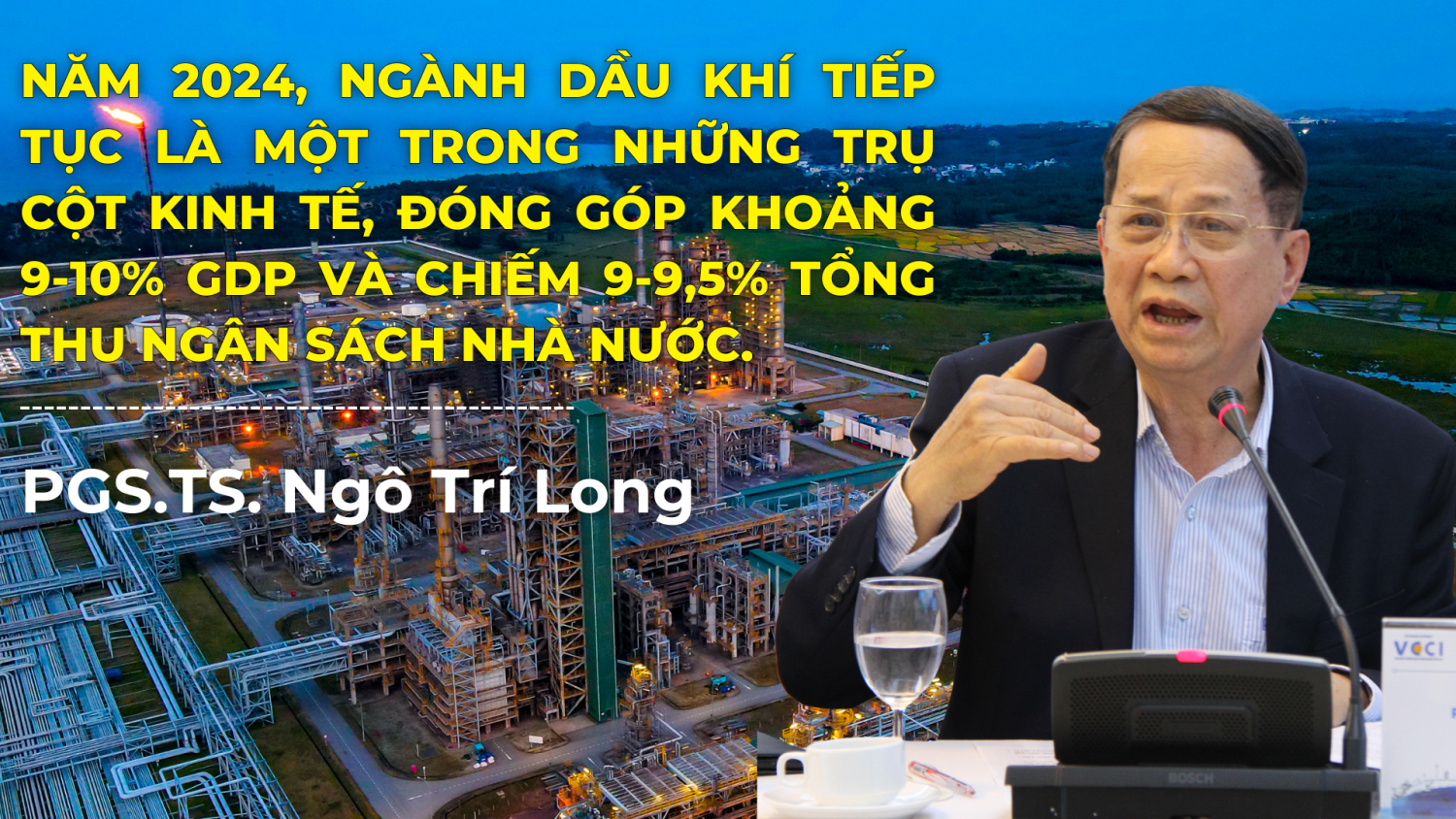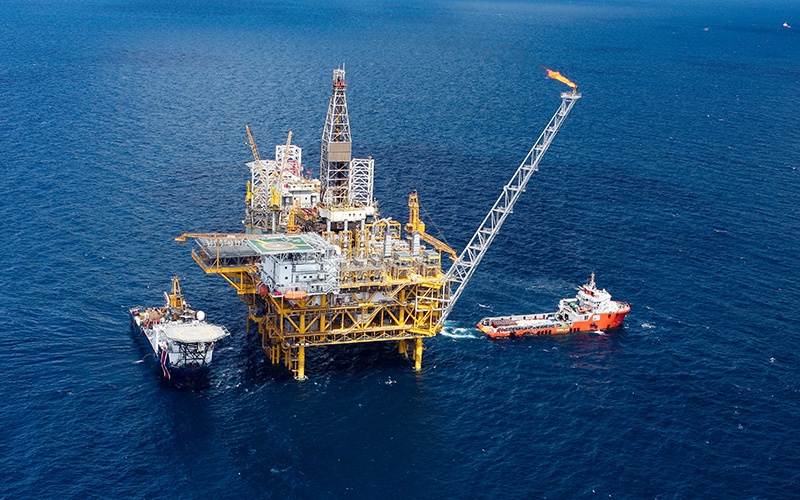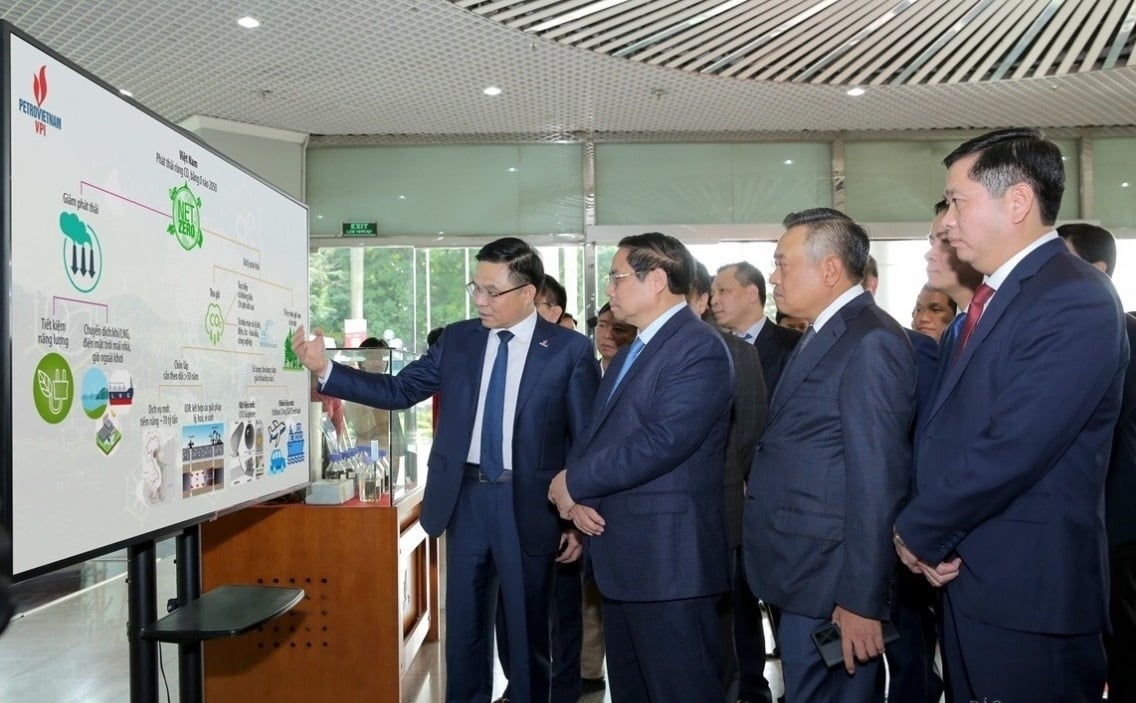Economic picture in 2024: Oil and Gas industry continues to be a pillar, making great contributions to the economy
To have specific analysis on the field with the greatest impact on the economy in 2024, thereby forecasting how Vietnam's economy will grow in 2025 and what solutions are needed to achieve the goal, the Reporter (PV) had an interview with economic expert, Associate Professor, Dr. Ngo Tri Long on this issue.
Economist, Associate Professor, Dr. Ngo Tri Long.
PV: Sir, how do you see Vietnam's economy in 2024?
Assoc. Prof. Dr. Ngo Tri Long: The year 2024 marks a challenging period but also holds many opportunities for the Vietnamese economy. With the global economy continuing to be affected by geopolitical instability and supply chain shifts, Vietnam has gradually affirmed its position as a bright spot in the Southeast Asian region. Key economic sectors such as manufacturing, export, technology and oil and gas have made significant progress, despite facing pressures from inflation, exchange rate fluctuations and declining global demand. In 2024, the Vietnamese economy will continue its impressive growth momentum, achieving many important achievements in all fields, with an estimated GDP growth rate of 6.8-7%, exceeding the target set by the National Assembly. This growth momentum is driven by strong recovery in the fields of export, industrial production and foreign investment.
Looking back at 2024, Vietnam's economy has achieved remarkable results, with high GDP growth, strong international trade and a recovery in the tourism industry. Despite facing some challenges such as inflation and the impact of natural disasters, the economy has maintained positive growth momentum, creating a solid foundation for the following years.
PV: In 2024, which areas will have the biggest impact on Vietnam's economy, sir?
Assoc. Prof. Dr. Ngo Tri Long: In my opinion, the industries that will have a major impact on Vietnam's economy in 2024 include: Services; Industry; Agriculture, forestry and fisheries; Processing and manufacturing industry; Transportation and logistics; Oil and gas...
In particular, the service industry plays an important role, accounting for 42.54% of GDP in 2023 and maintaining growth momentum in 2024. In particular, international tourism has recovered strongly with more than 12.7 million visitors in the first 9 months of the year, an increase of 43% over the same period last year.
The Oil and Gas industry continues to be one of the economic pillars, contributing about 9-10% of GDP and accounting for 9-9.5% of total State budget revenue. This demonstrates the important role of the industry in promoting economic growth and stabilizing national finances. In 2024, the Oil and Gas industry continues to play a key role in Vietnam's economy, not only contributing greatly to GDP and the State budget but also ensuring energy security, promoting investment, supporting energy transition, contributing to social security and protecting national sovereignty.
The manufacturing industry was the main driver of economic growth, with increased production and exports of key products such as electronics, textiles and footwear. The recovery of global supply chains and rising demand from major export markets supported the sector.
The agriculture, forestry and fishery sector continues to be the "support" of the economy, ensuring food security and contributing stably to growth. The transformation of crop structure and the application of new technology have improved productivity and product quality.
The information technology and telecommunications industry is considered one of the three industries with the greatest growth potential in the period 2024-2025. This industry makes an important contribution to digital transformation and economic modernization.
The development of transport infrastructure and increased commercial activities have boosted the transport and logistics industry, supporting the circulation of goods and services domestically and internationally.
The above industries have created a solid foundation for Vietnam's economic growth in 2024, contributing to enhancing the country's position in the international arena.
In 2024, the Oil and Gas industry will continue to be one of the economic pillars, contributing about 9-10% of GDP and accounting for 9-9.5% of total state budget revenue, supporting energy transition, contributing to social security and protecting national sovereignty... (Illustration photo)
PV: In addition to the achievements, what are the remaining shortcomings and limitations of Vietnam's economy in 2024, sir?
Associate Professor, Dr. Ngo Tri Long: International experts highly appreciate Vietnam's economic achievements in 2024, saying that Vietnam has made a strong impression in economic and diplomatic development, while exceeding growth expectations.
Although Vietnam's economy in 2024 has achieved many remarkable achievements, there are still some limitations and challenges that need to be noted, specifically: Economic growth has not met expectations. Although GDP in the third quarter of 2024 increased by 7.4% over the same period last year, this rate is not enough to create the necessary breakthroughs for sustainable development and help Vietnam escape the risk of falling into the middle-income trap. Vietnam still faces many limitations in foreign investment activities, investment promotion and State management of investment.
In addition, the coordination between fiscal and monetary policies has not been really effective, and there has not been a significant change in supporting businesses, promoting private investment and economic growth. The connection between the foreign direct investment (FDI) sector and domestic enterprises has not had a clear change, leading to the fact that Vietnamese enterprises have not participated much in the global value chain.
These limitations require Vietnam to continue institutional reform, improve competitiveness and strengthen linkages between economic sectors to promote sustainable growth in the future.
There is also pressure from global trade tensions. With the United States preparing to enter a new presidential term, the possibility of global trade tensions and risks may soon appear, affecting Vietnam's export activities and investment attraction.
PV: From the perspective of an economic expert, what is your forecast for Vietnam's economy in 2025?
Assoc. Prof. Dr. Ngo Tri Long: 2025 is forecast to be an important milestone in Vietnam's economic development, as the country continues to take advantage of opportunities from international economic integration and free trade agreements such as RCEP, CPTPP and EVFTA. In the context of increasingly deep globalization, the Vietnamese economy faces new challenges and opportunities, from supply chain fluctuations, inflationary pressures, to digital transformation and sustainable growth.
With a clear strategic direction from the Government and the active participation of the business community, Vietnam's economy in 2025 is expected to continue to maintain stable growth momentum, while transforming strongly to adapt to the trend of green, creative and high-tech development. In this picture, internal factors such as labor productivity, economic restructuring and the recovery of key industries such as exports, processing and manufacturing industries will play a key role, contributing to building an independent, self-reliant and effectively internationally integrated economy.
Forecasts for Vietnam’s economy in 2025 show a positive outlook, with GDP growth expected to range from 6.1 to 6.6%. Specifically, United Overseas Bank (UOB) forecasts Vietnam’s GDP growth to reach 6.6% in 2025, thanks to strong domestic factors and improvements in many economic sectors.
Factors supporting this growth outlook include a strong recovery in trade, manufacturing and foreign investment. However, experts also note potential challenges such as global trade tensions and devaluation pressure on the Vietnamese dong.
The Government sets a GDP growth target of 6.5-7% in 2025, with efforts to achieve a higher level of 7-7.5%. To achieve the socio-economic targets in 2025, the Government has set out 11 main tasks and solutions: Prioritizing promoting economic growth; Maintaining macroeconomic stability and controlling inflation; Making breakthroughs in development institutions; Developing synchronous and modern infrastructure; Restructuring economic sectors associated with digital transformation and green transformation; Developing high-quality human resources; Developing culture, society and ensuring social security; Strengthening resource management and environmental protection; Consolidating national defense, security and social order and safety; Improving the effectiveness of foreign affairs and international integration; Promoting the building of a socialist rule-of-law state.
The synchronous and effective implementation of the above solutions aims to achieve the GDP growth target of about 6.5-7% in 2025, with GDP per capita reaching about 4,900 USD, while ensuring macroeconomic stability and improving people's lives.
In addition, I think it is necessary to focus on solutions such as removing institutional and policy bottlenecks, unblocking resources and effectively handling obstacles to develop stable, safe, healthy and sustainable markets. At the same time, promoting disbursement of public investment capital to stimulate economic growth and improve infrastructure; creating a favorable business environment to attract more foreign direct investment (FDI), supporting growth and technology transfer; promoting the application of digital technology and promoting green and sustainable economic sectors to create new growth drivers; continuing administrative reform, perfecting the legal framework to support businesses and enhance the competitiveness of the economy.
Thank you!
In 2024, the Oil and Gas industry will continue to be one of the economic pillars, contributing about 9-10% of GDP and accounting for 9-9.5% of total state budget revenue. This demonstrates the important role of the industry in promoting economic growth and stabilizing national finances. In 2024, the Oil and Gas industry will continue to play a key role in Vietnam's economy, not only contributing greatly to GDP and the state budget but also ensuring energy security, promoting investment, supporting energy transition, contributing to social security and protecting national sovereignty.
Economist, Associate Professor, Dr. Ngo Tri Long
Manh Tuong (performed)
Comment
Source: https://www.pvn.vn/chuyen-muc/tap-doan/tin/25e789f8-dfec-4d2a-ba18-0a7d8e939158



















































Comment (0)